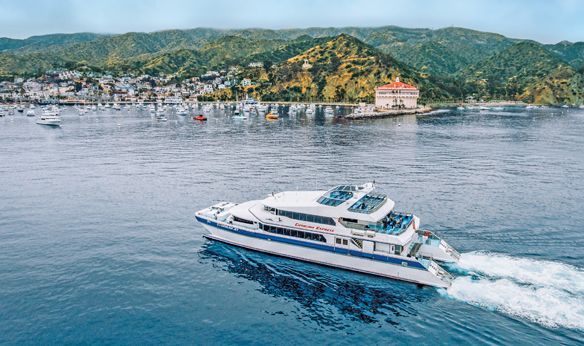
By Anni Marshall
As our state now sees a glimpse of light at the end of the pandemic tunnel, the little island of Santa Catalina faces the specter of even darker days ahead. Pending state regulations on harbor craft, including the ferries that bring visitors and essential supplies to the island and bring our residents to the mainland, will kill off our hospitality-based economy, and we will never be able to “roar back.”
The proposed California Air Resources Board (CARB) rules require repowering ferries and other vessels with Tier IV classified engines, the cleanest burning engines available.
The zealous pursuit of good goals cannot destroy the livelihoods and lives of the people they are intended to protect. To avoid this impact, the CARB harbor craft rules must be rejected or significantly modified. Greenhouse gas emission rules are intended to protect the environment, a good goal valued by all Californians, including Islanders. We are proud of our own Catalina Island Conservancy, the largest private land trust in Southern California, with its mission of being “a responsible steward of our lands through a balance of conservation, education, and recreation.”
Due to the unique geography of Catalina – an island, located 22 miles off the California coast — we are physically and financially dependent on coast-to-Island ferries. If enacted as proposed, the new CARB rules will effectively create an economic and social moat around Catalina, causing disproportionate harm and suffering to our residents and visitors.
The cost to modify an existing ferry is estimated to be seven million dollars, and the cost to build a new one likely exceeds $20 million per vessel. With no funding assistance for operators to cover the mandated replacements, CARB recommends passing these costs along to passengers as an additional ticket cost.
The cost to renovate or build new ferries are astronomical and the likely increases in ticket costs would be prohibitive for our residents and visitors alike. These increases will discourage ferry usage and travel to our harbors, especially by low-income California families that seek inexpensive outdoor recreation on the island.
In addition, the new engines will add tremendous weight to ferries, requiring severe reductions in passenger capacity. In a region where visitor spending comprises the vast majority of local revenues, the estimated 56% of lost passenger capacity means effectively cutting our tourism – and our tourism revenues – by more than half.
The pandemic has already completely depleted our harbor fund and associated reserves. These funds pay for all maintenance and city-funded services along the waterfront. To stem losses we have been forced to make severe cuts to labor and contract services, and deferred much needed maintenance. We will not be able to provide even minimal essential services if we have an ongoing reduction of our annual visitors.
Finally, the proposed rules would disproportionately impact the residents and workers of Avalon and Catalina – all Californians. Imagine the uproar if transportation into and out of any other California city was halved and residents couldn’t easily get to medical appointments, jobs, or shopping for necessities. Now compound that inconvenience by a 22-mile stretch of water. If ferry traffic is limited, our residents’ only other options are to utilize helicopters or private vessels at much greater expense. These are not feasible costs for any group to bear, but are especially out of reach in a region with a 15% poverty rate and a hospitality-based population that is almost 70% Latino.
There are other, less devastating options available to CARB that will allow the state to meet its desired environmental goals while protecting Catalina.
The most promising is to mandate Tier III engines for now, while working to eventually transition all ferries to zero-emission, vessels as new technologies being developed prove commercially viable in the coming years. Providing a reasonable funding allowance for the transition would help the ferry industry absorb retrofit outlays without passing costs onto passengers. Most importantly, requiring Tier III but not Tier IV during the transition would negate the need for passenger reductions and more roundtrips.
In a year when we have all suffered so much hardship, the CARB board must seize the opportunity to adjust its harbor craft rule, to prevent causing more human and economic harm than we’ve already suffered.
Anni Marshall is the mayor of the city of Avalon on Santa Catalina Island.










